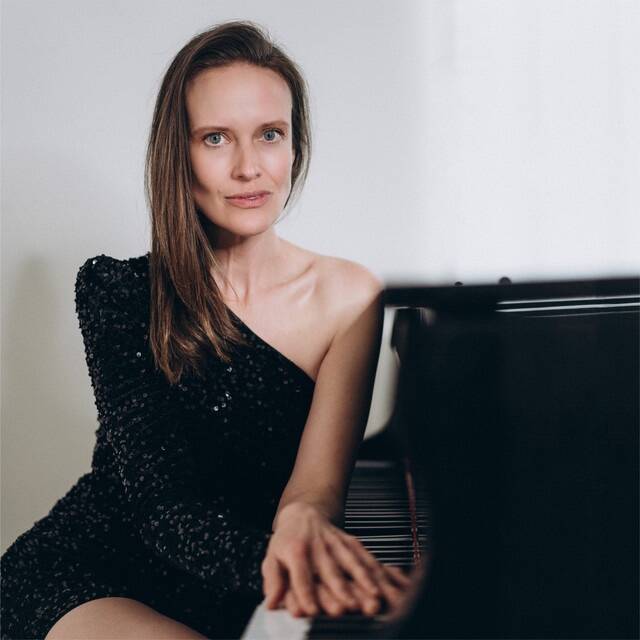Vashon Center for the Arts will present its 2nd annual Piano Fete from July 5-8, in the art center’s Kay White Hall.
The series, with four pianists and two pianos, has been curated by Vyacheslav Gryaznov — better known to island fans as Slava — who made his Vashon debut in 2018. The series will feature Gryaznov, Konstantin Soukhovetski, Rexa Han, and Katya Kramer-Lapin.
In advance of Piano Fete, The Beachcomber is presenting a series of interviews with all four pianists, conducted by islander Michael Tracy. Tracy is a local musicologist and trusted advisor for VCA’s curation of classical music programs. This week, Tracy spoke to Katya Kramer-Lapin. — Elizabeth Shepherd, Editor
You start the four-day Fete with works and transcriptions of Russian and French composers of the Belle Epoque – from 1870 to 1920. Certainly, Debussy and Ravel were influenced by the Russian greats: Glinka, Tchaikovsky, and Rimsky-Korsakov. Do you think that there was equally a French influence on Russian composers?
I have recorded Debussy and I plan soon to release a Ravel recording, so I am carrying a long tradition of international artists who have been influenced by French as well as Russian composers. Even with Ravel writing into the 20th Century, French culture was then considered “haute” culture. And it wasn’t just in music, Russian households employed French nannies, often spoke French at home and read French literature.
At age 4, you started studying piano in Moscow until you started college. Then you studied in Cologne, Germany, and at Oberlin in Ohio. From your experience, is piano pedagogy the same wherever you’ve studied, or are there strikingly different approaches? I wonder if your experience at Oberlin was quite different than in Moscow.
Piano training in the Genssin School of Music in the USSR in the mid-80s would be comparable to training for the Olympics. I competed for my position at age 6 and trained as [a] professional ever since then. Expectations even for young children were rigorous. Regarding my training in Moscow, it was intensely technical to achieve virtuosic excellence.
When I came to the US at age 18, I was able to develop my artistry. I worked with one teacher during the Moscow years, then one professor at Oberlin, and finally one at Indiana University Jacob’s School of Music. Though the training was challenging, I’m grateful for that experience because it allowed me to grow as an artist. On another note, aside from being a recording artist and concert pianist, I enjoy teaching. Very soon I am releasing, through Oclassica, an online series of master classes with a vast range of pedagogical content.
You and your husband, a violinist, are raising four children. That is itself a full-time job. How do you find time during a normal week to practice? Are your children learning to play music as well?
Let me paint you a picture: I’m up before the sun, I make meals for all the children before sending them off to school — once they’re off, it’s all music. Once the kids are at home, I teach private lessons (my own children have their own interests in arts, athletics, etc.) Each evening I spend time with my husband who is an excellent marital and musical partner. Honestly, it’s a challenging and rewarding routine, but sometimes I need to reconnect with nature. When I’m out on my own for a hike or beach walk, at the Outer Banks, that is when I can engage in my mental practice, running pieces through my mind.
What would be your ideal program if you were to perform solo next season?
Once I had an audience member come up to me and said that she loved my concert because it was just like her playlist.
For me, an ideal concert is when I reach my audience in this manner. This has been made easier through my fortunate partnership with Oclassica, an innovative classical music record label renowned for its data-driven approach. By carefully analyzing listeners’ preferences, Oclassica provides valuable insights and repertoire suggestions.
Collaborating with Oclassica enables me to establish a more immediate connection with my audience. Additionally, I have a passion for piano transcriptions, which translates an entire orchestra to the piano. I love bringing this type of music to an audience. At July’s Piano Fete, I’m bringing three amazing transcriptions for piano solos. Works that were originally written by Glinka, Tchaikovsky, and Ravel were brilliantly arranged for piano by Slava Gryaznov.
I’m absolutely giddy to share the stage with these amazing pianists this July for the Vashon Piano Fete 2023. The audience can look forward to a dynamic and diverse program.


